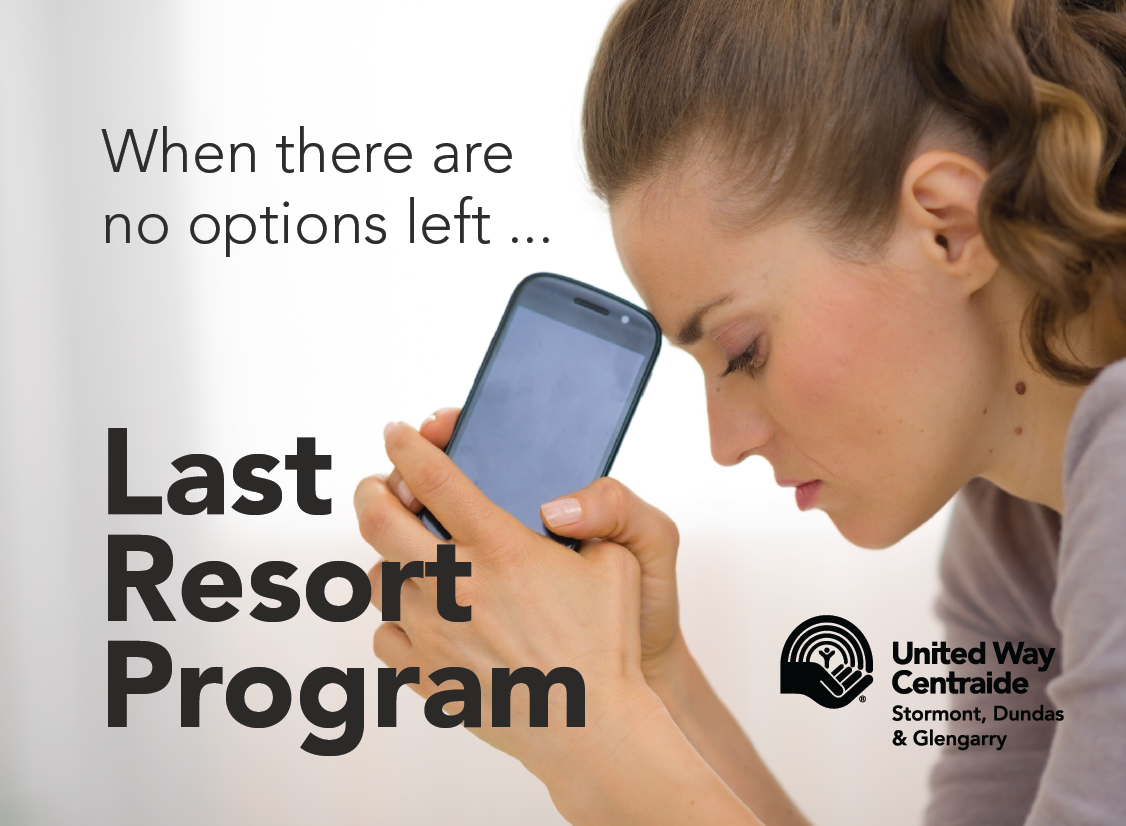During the pandemic, United Way and Social Development Council of Cornwall & Area created the Regional Emergency & Strategic Response Council (RESRC), a collective of approximately 20 different local leaders (including representatives from the hospital, police, OPP, and school boards) who work together to address the most pressing needs in the communities of SDG, Cornwall, and Akwesasne.
“Over the pandemic, there was lots of job loss and lots of people being thrust into poverty in ways we had never seen before, particularly for the working poor. We realized that the social nets that are in place within our government have massive gaps within them,” explained Juliette Labossière, Executive Director of United Way Centraide of S.D. & G.
That’s where the Last Resort Program was born.
“We as a collaborative, completely mapped out the social networks that exist to assist people when they live a one-time crisis in their life and created a program that is exactly what it is called – a last resort,” said Labossière, “If you have gone to every source of government funding or not-for-profit led funding to help you with your crisis that you are living, the Last Resort Program can help you if you don’t qualify for any of them.”
The Last Resort Program originally received $160,000 in funding donated by two philanthropic families who wanted to work with United Way to find a solution to our local housing crisis.
That initial $160,000 that was invested into the program saw 25 individuals across SDG and Cornwall who were currently homeless or precariously housed find stable and affordable housing. The program helped with costs of moving, like first and last and connection fees that prevent people from securing housing even though they can afford rent with their income. The funds also helped 100 more people get caught up on bills like heat, hydro, and rent arrears.
For 2023, the City of Cornwall has committed $320,000 from the Social Services Relief Fund to the Last Resort Program. With the current rental market in short supply and prices climbing, United Way is using those funds to make sure people can stay where they are.
“The last thing we want is for someone to get evicted into the current market, because they will find themselves with rents maybe double if not triple where they are now. And if they aren’t somewhere, we want to get them into somewhere that they can sustain on the long term,” Labossière shared.
Last month, United Way SDG made presentations to Cornwall and SDG Councils about the Last Resort Program. The idea was to make the councils aware of the great work being done through this program and inform them that no sources of funding are lined up for 2024. If the councils choose to invest in this program next year, the funding will likely come from the property tax base.
To help make the program more sustainable, United Way has launched a micro-loan portion of the program. If you are hard on your luck and need help paying first and last or getting caught up on rent or bills, you can apply for a maximum of $2,000.
Another option if you have a bit of liquidity at the end of the month is to participate their brand-new loans program in collaboration with Your Credit Union. Credit is key for anybody who is trying to work their way out of poverty and get two feet on the ground but there’s not a lot of opportunity for individuals to get good rates on loans. The Last Resort Program guarantees the best loans on the market, said Labossière.
Intake for anybody who wants to access these loans is through the Agapè Centre for Cornwall residents and House of Lazarus for residents of the counties.
“We were only fortunate enough to take the time to develop this program and be really innovative because we had two donors take a chance on us and donate money to us to be able to do more. I just want to make sure the community knows that although these are large sums and we are happy to invest them, we still need donations to keep solving issues for our community. We’ve seen donors drop off because they don’t think we need the money anymore but everything we’re getting in we’re pouring back out. We still need those donations,” Labossière concluded.



